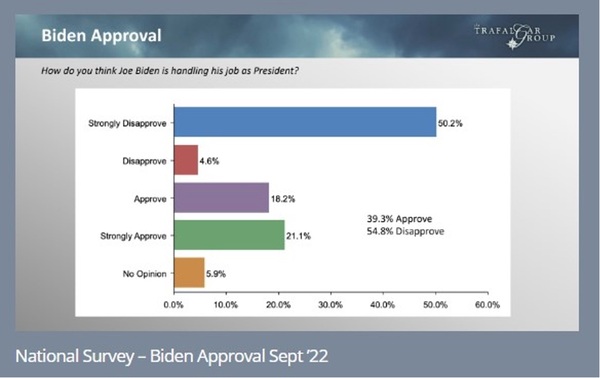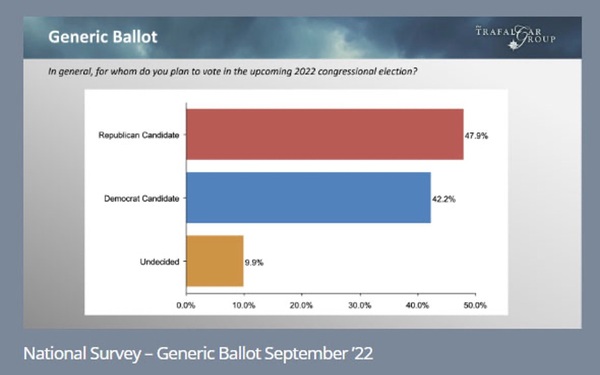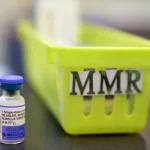
–>
September 27, 2022
Polls are an essential part of political races. Candidates who score well are more likely to attract new donations, get their way in the timing and number of debates, and receive more media coverage.
‘); googletag.cmd.push(function () { googletag.display(‘div-gpt-ad-1609268089992-0’); }); }
The way polls are conducted has a huge impact on the results generated, including who is asked, who does the asking, and the way the questions are phrased.
Rassmussen Reports is a respected polling organization founded in 2003. On September 23rd they reported…
– President Biden ended the polling week with a daily job approval of 43%.
– The 2022 midterm elections are now 46 days away, and Republicans have a two-point [generic ballot] lead in their bid to recapture control of Congress.
Another company, Trafalgar Group, released their first poll in 2016 and was “rated the second most accurate pollster on the 2020 presidential election by FiveThirtyEight.”


‘); googletag.cmd.push(function () { googletag.display(‘div-gpt-ad-1609270365559-0’); }); }
Their conclusions on the same topics were different, with Biden’s approval lower by 4% and Republicans’ lead in the generic ballot higher by 3.7%. This may seem like a minor difference to you, but elections often are decided by a 1% margin or less.
So the polling companies’ methods become very important. If they get it wrong, the results are useless, and can even be harmful by giving voters the impression that the race is over and they won’t make a difference by voting, or by encouraging one group to turn out in greater numbers.
“Data for Rasmussen Reports survey research is collected using an automated polling methodology. Generally speaking, the automated survey process is identical to that of traditional, operator-assisted research firms such as Gallup, Harris, and Roper. However, automated polling systems use a single, digitally-recorded, voice to conduct the interview while traditional firms rely on phone banks, boiler rooms, and operator-assisted technology.”
The Trafalgar Group has a different approach and delivers their… “polling questionnaires utilizing a mix of six different methods: Live callers, Integrated voice response, Text messages, Emails, and Two other proprietary digital methods we don’t share publicly.”
They use “short questionnaires of nine questions or less based on our perceptions about attenuated attention spans and the need to ‘accommodate modern busy lifestyles.’ Our polls last one to three minutes and are designed to quickly get opinions from those who would not typically participate in political polls.”
They have “also pioneered methods to accommodate the ‘Social Desirability Bias.’ This allows us to obtain a poll participant’s true feelings in situations where we believe some individuals are not likely to reveal their actual preferences.”
‘); googletag.cmd.push(function () { googletag.display(‘div-gpt-ad-1609268078422-0’); }); } if (publir_show_ads) { document.write(“
Their
“approach to polling is markedly different from most of the industry. We believe the old system of delivering 20 or more questions via live phone interviews doesn’t fit the modern world. This old system skews toward people who have strong ideology and/or opinions and even worse, those who are bored and looking for someone to talk to. It also fails to address the growing number of people who refuse to share their honest opinion and the new trend of people who refuse to participate or intentionally give false answers because they question who is asking and why.”
Trafalgar identified a new issue – “the shy voter” – who is reluctant to respond to pollsters. Think of it this way, you’re sitting at home after dinner and you get a robocall asking your political views. How do you know it’s a legitimate polling company and your results will be kept confidential? Would you want your boss at work to know you support a candidate he doesn’t like?
This concern about shy voters intensified with Biden’s September 1st speech about “The Continued Battle for the Soul of the Nation.” It has been viewed as one of the most aggressive and divisive speeches ever given by a President.

YouTube screengrab
Just 300 words into his speech he exclaimed, “Donald Trump and the MAGA Republicans represent an extremism that threatens the very foundations of our republic.”
Add this to the news that the Democrats plan to add 87,000 IRS agents to audit our taxes, and that ordinary citizens have been harassed by the Department of Justice and the FBI, not to mention the seizure of “Pillow Guy” Mike Lindell’s phone, and you have an understanding why people might not want to honestly answer a telephone call or online survey.
But there is another piece of the puzzle that may be impacting polling accuracy – shy Democrat voters who are beginning to realize that their party isn’t what it used to be. They may not answer polls honestly, but even more important, they may not want their social groups to know their feelings have changed.
Social groups are extremely important to people. Psychology Today says,
“…everywhere you look there are groups… Entire wars are fought with this as a central tenet: we are better than them, more noble, fighting the good fight. Of course, the other group we are opposing thinks the exact same thing. That’s the power and influence of groups.”
It is a basic part of human nature and survival to do or say almost anything in order to remain a member in good standing of your social group.
So conservatives may fear retribution, and liberals may fear being shunned by their peers, including their spouses. Polls might be seriously overestimating the position that liberals hold in every race across the country.
It seems as if the pollsters don’t mind being wrong; otherwise, they would have cleaned up their methods long ago. Some may like overstating the liberal position and depressing conservative turnout. At the very least, the media companies who commission these polls like covering a close race because it brings higher ratings.
But there is another, more sinister aspect to understating a conservative lead. It can serve to hide organized cheating at the ballot box. If the polls say the conservative is behind in the polls and then loses by 1%, it’s easy to claim the race was legitimate. But if the polls say the candidate is 5% ahead, and then loses by 1%, the likelihood of cheating becomes more plausible and questions will be asked.
In 2016, “Clinton had been heavily favored to win. She led national polls and in most battleground states heading into the election. Her allies were so confident that a supportive super PAC had actually redirected millions to other races.”
Cahaly from Trafalgar was one of the few that predicted the Trump win in 2016, and projected his win in 2020 as well. On election night, “in his last few polls of this election season, Mr. Cahaly has found Mr. Trump with two-to-three-point advantages in North Carolina, Arizona, Michigan and Florida, and wider leads elsewhere. That puts him far out of line with almost all major pollsters, whose surveys in those states are generally showing Mr. Biden with the edge.”
The Biden “victory” was in part doubted because of the difference between the Trafalgar polls and the election “results.”
The takeaway? Understand that polls are tools used by the Left to suppress conservative votes and to give legitimacy to election results that may be fraudulent. Going to the polls on November 8th is more important than ever. Bring ten of your friends with you. And report any instances of election irregularities to your state board of elections.
<!– if(page_width_onload <= 479) { document.write("
“); googletag.cmd.push(function() { googletag.display(‘div-gpt-ad-1345489840937-4’); }); } –> If you experience technical problems, please write to [email protected]
FOLLOW US ON
<!–
–>
<!– _qoptions={ qacct:”p-9bKF-NgTuSFM6″ }; ![]() –> <!—-> <!– var addthis_share = { email_template: “new_template” } –>
–> <!—-> <!– var addthis_share = { email_template: “new_template” } –>







